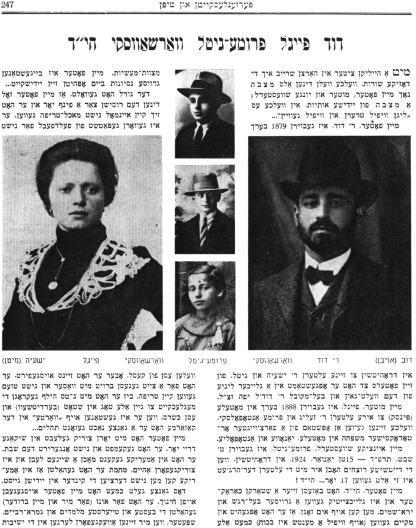
[Page 247]
[Page 248]
to study in yeshivas, he supported us as much as he could. Mother would go out in the worst blizzards in order to find opportunities to ship us food and other products by train.
My father never went to a workplace where he couldn't first pray with a quorum in a synagogue. The workers would lie down on the wagons and wait for him to return from synagogue. My father was an honest and dependable worker. In his work in construction (mostly at the estates of landowners) Father would work overtime, fearing misleading someone. Many a Friday Father would pay his workers, leaving him with very little for himself. He was always concerned about another person's money, and was a very modest person.
On the Sabbath Father never went anywhere besides to and from synagogue. He would spend the whole day with a book at home or study together with a group in synagogue. He was among the first to arrive at synagogue and among the last to leave. If there were ever a poor person who had nowhere to eat, Father would invite him home for the Sabbath.
As far as I remember, Father used to fast every eve of a new month, and on Rosh Hashanah and Yom Kippur he remained standing throughout the services. He was also careful about gossiping, and was gentle.
Almost every Sabbath, Father had a guest at the table. In addition to the fact that the synagogue custodian would regularly send us someone carrying a note of introduction, Father would also bring some other unexpected guest. Mother was happy to share whatever was left with guests.
My mother also always read the Yiddish translation of the Torah. She studied the Yiddish anthology, Tseina Ureina, and read prayers to women at home or in the synagogue. She was very observant.
Right after World War I, Father wanted to sell our home and land and move to Palestine. However, he was over 35 years old and couldn't obtain a certificate from the Jewish Agency. In 1941, when the Russians sent a few Drohitchin families off to Russia, the Russian made an error and took Father, Mother and my sister (The Russian were looking for another David Warshavsky who was no longer alive). I was told that my mother cried uncontrollably, and Rabbi Kalenkovitch and some community leaders went to the Russian commissar on the Sabbath to appeal for their release.
As mentioned earlier, the German murderers took my parents and sister (as well as hundreds of other Jews) to Brona-Gora, near Kartuz-Bereza, to the limestone mines and killed them in awful ways. May G-d avenge their blood! The curse was decreed on July 25, 1942, but the actual killings occurred on Sunday, July 26, 1942. See pp. 117, 137, 305 and 307.
Finally, it should be mentioned that my only brother, Yeshayahu Warshavsky, who tried to get an emigration certificate for three years, finally arrived in Palestine in 1938.
(Abridged from Rabbi Dov B. Warshavsky's Scroll of Ecclesiastes of the Third Destruction, Chicago, 1952.)
[Photo and free translation of verses from Ecclesiastes 1 and 2]
Arise in the night, at Midnight, pour out your heart before G-d. Turn your hands to Him in supplication for the souls of those who harmed you. Young and Old, young men and virgins lie on the ground, killed by the sword. Ecclesiastes 2
For these I weep. Tears flow from my eyes because my consolation is far from me to restore my soul. May all their evil come before You, because whoever harms him, harms You. Many are my groans, and my heart aches. Ecclesiastes 1
Previous Page
|
Next Page
JewishGen, Inc. makes no representations regarding the accuracy of
the translation. The reader may wish to refer to the original material
for verification.
JewishGen is not responsible for inaccuracies or omissions in the original work and cannot rewrite or edit the text to correct inaccuracies and/or omissions.
Our mission is to produce a translation of the original work and we cannot verify the accuracy of statements or alter facts cited.
 Drogichin, Belarus
Drogichin, Belarus
 Yizkor Book Project
Yizkor Book Project
 JewishGen Home Page
JewishGen Home Page
Copyright © 1999-2025 by JewishGen, Inc.
Updated 13 Dec 2001 by LA